Today’s News, Tomorrow’s History is an ongoing series with Listenwise. This series connects Facing History’s themes with today’s current events using public radio to guide and facilitate discussions around the social issues of our time. We will take a look at voting requirements in local elections and the proposal in Maryland to allow non-citizens to vote.

A city in Maryland is debating whether to allow non-citizens to vote in local elections and cast ballots for mayor and other city officials. Federal law requires voters in federal elections to be citizens. Maryland, unlike most states, allows towns and cities to decide who can vote in local elections. Several towns in Maryland have voted to allow non-citizens to vote.
A proposal in the city of College Park, MD would allow undocumented immigrants, student visa holders, and residents with green cards to vote starting in 2019. This is at a time when other places around the United States are imposing voter restrictions and a federal commission is focusing on voter fraud. About 20 percent of the city’s residents are not born in the United States, according to data from the Census Bureau and the University of Maryland campus at College Park has about 3,600 international students. The proposal is meant to include everyone in the community in decisions that will affect them.
The Council Member who sponsored this voting measure wanted to include long-term residents of her community in the decision-making process of town governments. The College Park City Council voted 4-3 to pass this amendment but it needed six votes of the eight-member council to pass. Listen to this story and then debate: Should non-citizens be allowed to vote in local elections?
Join the conversation:
Why do some people say this proposal dilutes the meaning of citizenship? What are the pros and cons of this proposal? What is the benefit of community involvement before a proposal is made by the city council? Do you think the timing of this proposal affected the community reaction? Why or why not? Do you think non-citizens should be allowed to vote in local elections?
Keep the conversation going with Facing History’s resources:
- Explore our lesson, “Citizen Power Makes Democracy Work,” to help students reflect on what it means to be a good citizen and how citizens learn to use their power to make change.
- Read our blog post, “3 Angles to the US Voter Fraud Controversy,” to gain a better understanding of the main perspectives driving concerns over this recent investigation.
- Use our reading, “We the People of the United States,” to consider the question “Who is included in ‘We the People’?"
Explore more stories about refugees from Listenwise:
- Not all states have ID requirements for voters. Listen to learn more about voter ID laws and think about whether this might push people away from voting or help prevent fraud.
- In 33 states in the United States, early voting is allowed for qualified voters. Listen to this story about early presidential voting to learn about this new way to vote.
- Listen to this story about how adding questions about citizenship to the US Census may result in fear in immigrant communities and result in some populations being undercounted.
Listenwise helps teachers use public radio stories in their classrooms. To find more public radio stories and lessons for your middle and high school ELA, social studies, and science classrooms you can sign up for a free Listenwise account!



